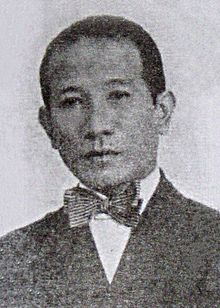Andjar Asmara
| Andjar Asmara | |
|---|---|

Andjar, 1930
|
|
| Born |
Abisin Abbas 26 February 1902 Alahan Panjang, West Sumatra, Dutch East Indies |
| Died | 20 October 1961 (aged 59) Cipanas, West Java, Indonesia |
| Nationality | Indonesian |
| Known for |
|
| Spouse(s) | Ratna Asmara |
Abisin Abbas ([aˈbisɪn aˈbas]; 26 February 1902 – 20 October 1961), better known by his pseudonym Andjar Asmara ([anˈdʒar asˈmara]), was a dramatist and filmmaker active in the cinema of the Dutch East Indies. Born in Alahan Panjang, West Sumatra, he first worked as a reporter in Batavia (modern-day Jakarta). He became a writer for the Padangsche Opera in Padang, where he developed a new, dialogue-centric style, which later spread throughout the region. After returning to Batavia in 1929, he spent over a year as a theatre and film critic. In 1930 he joined the Dardanella touring troupe as a writer. He went to India in an unsuccessful bid to film his stage play Dr Samsi.
After leaving Dardanella in 1936, Andjar established his own troupe. He also worked at a publishers, writing serials based on successful films. In 1940 he was asked to join The Teng Chun's company, Java Industrial Film, helping with marketing and working as a director for two productions. After the Japanese occupation, during which time he stayed in theatre, Andjar made a brief return to cinema. He directed three films in the late 1940s and wrote four screenplays, which were produced as films in the early 1950s. He published a novel, Noesa Penida (1950). Afterward he worked for the remainder of his life writing serials based on local films and publishing film criticism. Historians recognise him as a pioneer of theatre and one of the first native Indonesian film directors, although he had little creative control of his productions.
Andjar was born Abisin Abbas in Alahan Panjang, West Sumatra, on 26 February 1902. He gravitated toward traditional theatre at a young age after visits from the wandering Wayang Kassim and Juliana Opera stambul troupes; he pretended to act with his friends in stage plays which they had seen. After completing his formal education up to the Meer Uitgebreid Lager Onderwijs (junior high school) level – first in Malay-language schools then Dutch ones – he moved to Batavia (modern-day Jakarta). He worked as a reporter for two daily newspapers, Bintang Timoer and Bintang Hindia; he may have also worked on a farm.
...
Wikipedia
